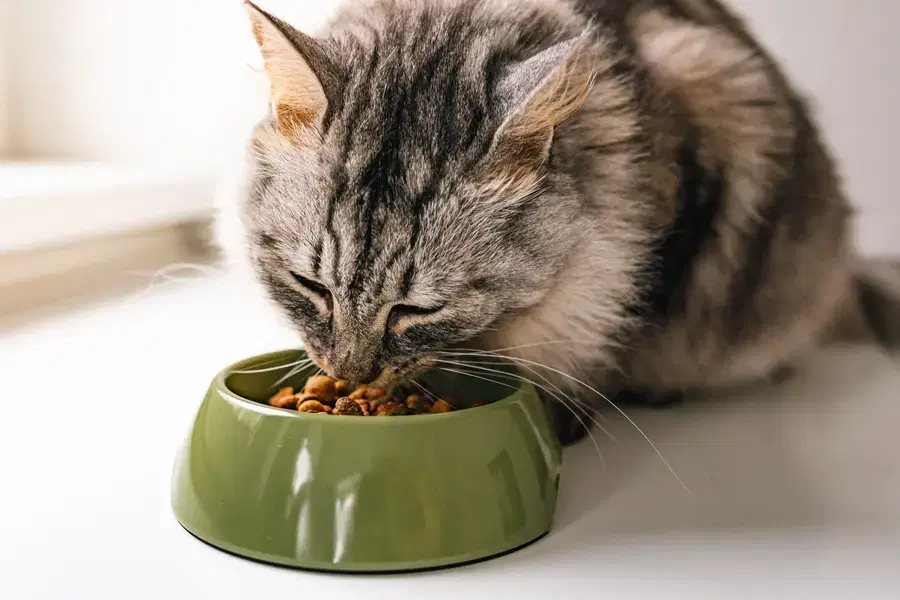The national fruit of India, Pakistan, and the Philippines, mangoes are undoubtedly one of the juiciest, yummiest, and most tempting fruits of all time. The mango finds its origins in the southern part of the Asian subcontinent which includes countries like India and Bangladesh. However, there are several cultivators of this fruit which give it many varieties in terms of shape, sweetness, size, and skin color.
There are hundreds of delicious recipes that can be made with mangoes including milkshakes, ice creams, chutney, curry, and one of the best options – mango juice. (Don’t forget to try ‘Aamras’ next time you’re in India during the summertime). Having said that, do our feline friends get as excited by mangoes as we do?
Can Cats Eat Mango?
So, to just answer the question at hand, yes, cats can eat mangos. But there is more to know about feeding mangos to your cat, and the benefits it can provide, continue reading to learn more.
Do Cats Like Mangoes?
Humans and even dogs find mangoes very attractive because we have the taste buds for sweetness. Cats on the other hand lack sweet taste buds and are not very attracted to mangoes on their own.
Having said that, your cat may be curious about mangoes given their natural tendency to get curious about the foods their humans eat. So, maybe just out of curiosity, your cat may want to put a little mango in their belly.
Are Mangoes Good for Cats?
Cats are carnivorous and are not supposed to be fed fruits and vegetables on a daily basis. Many vegetables are even toxic for them. But among those few human foods that are safe for them to eat, mangoes are one of them.
A cup of sliced mangoes, around 165 grams, consists of the following:
Calories: 107
Fiber: 3g
Sugars: 24g
Protein: 1g
Potassium: 257mg
Vitamin C: 76% daily value
Vitamin B6: 0.2mg
Vitamin A: 25% of daily value
Mangoes can help with weight management, improve digestion, and also have some anti-cancer properties. Now if this is the deal for humans, it could look like a great deal for cats as well. The truth is a little more complex.
Health Benefits of Mangoes for Cats
While mangoes are very delicious and nutritious for cats, your cat may not be able to extract all the nutrients that your stomach would be able to. This is because a cat’s digestive system is made to digest meat efficiently, and not fruits or vegetables. However, cats may be able to extract a good amount of vitamin C from the fruit, but they don’t actually need that much of it. Whatever Vitamin C is needed for your cat can be extracted easily from their regular daily diet.
How Much Mang Can I Feed My Cat?
While we know that mangoes are relatively safe for your cat, there is a limit to how much mango you should be giving them. The recommended quantity is no more than one or two small cubes once in a while. You need to make sure that mangoes are just an occasional ‘good behavior’ treat, and not a part of their daily meal. Your cat can face health challenges if you end up feeding them too much mango.
How Can You Feed Mangoes to Your Cat?
Before you offer your cat some of your mango, it is important that you know how to serve it to them:
No seeds – The seed should be removed so that your cat doesn’t end up biting it and potentially facing dental issues.
No peel – The peel can be quite toxic to your cat. Also, the pesticides and dirt on the peel can cause problems. Peel the mango before giving any to your cat.
Tiny cubes – Do not give your cat an entire mango. Make sure you divide the mango piece for your cat into small, bite-sized portions.
Fresh Mango only – Do not feed your cat any type of mango syrup, dried mango, or mango-based artificial drink. They could contain a lot of sugar and can harm your cat.
My Cat Ate Too Much Mango. What Do I Do?
Cats typically do not enjoy sweet fruits, and the chances of your cat overindulging on mango are low. Aside from being sweet, mangoes are acidic in nature and your cat may not like it too much anyway. However, if you end up overfeeding mango to your cat or if they ingest too much while you’re not looking, keep an eye out for the following side effects:
Diarrhea
Choking
Which Cats Should Not Eat Mangoes?
There can be some cats, not specific to any breed, which can be more susceptible to stomach harm from Mangoes. For them, Mangoes should altogether be eliminated. The list includes –
Cats with obesity problems – Cats that have a tendency to become overweight or are already on the obese side should completely avoid mangoes because of the high sugar content.
Cats with diabetes – For the same reason, cats with a tendency of diabetes should avoid eating mangoes.
Conclusion
Mangoes are safe for your cat to eat, but only given as an occasional treat in small pieces. While you may enjoy the taste and the nutritional benefits of the beautiful yellow-golden fruit, your cat may not enjoy the taste or benefit from their nutritional value like us humans. So, go on and enjoy your summer with tons of mangoes for your belly, but keep it low for your feline buddy.

I’m Charlie: canine enthusiast with a knack for figuring out why my dog, Dallas, is more infatuated with tennis balls than me. My lifelong passion for dogs has created a dedication to help other pet parents better understands their furry family members!
*Jan 2019 to Aug 2024 Spot Pet Insurance Services, LLC claims data.
"Mango History and Production," Mango.org, n.d., https://www.mango.org/Mangos/media/Media/Documents/Foodservice-Culinary%20Education/Mango_History_Production_Lesson_1_010614.pdf
Woodnutt, Joanna. “Can Cats Eat Mango?” Cats.com, 17 Feb. 2025, https://cats.com/can-cats-eat-mango.
Raman, Ryan. "10 Health Benefits of Mango," Healthline, 02 Jun. 2025, https://www.healthline.com/nutrition/mango.
“Can Cats Eat Mango?” Purina, 28 Jul. 2025, https://www.purina.com/articles/cat/feeding/can-cats-eat/mango.
The information presented in this article is for educational and informational purposes only and does not constitute or substitute for the advice of your veterinarian.












